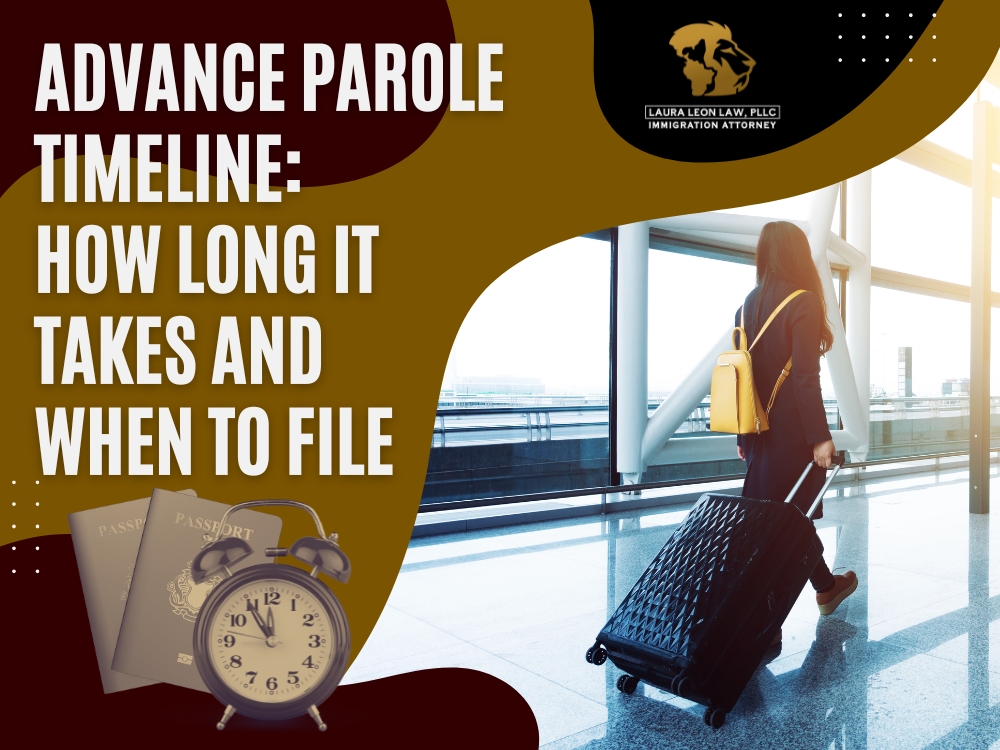Advance Parole
IMMIGRATION ATTORNEY LAURA LEON
United States immigration procedures can often feel overwhelming, especially when you must travel internationally while your immigration status is pending. A common concern among applicants is ensuring that temporary travel outside the U.S. does not negatively impact their ongoing immigration cases. This is where advance parole becomes critical.
What Is Advance Parole?
Advance parole is an official authorization issued by United States Citizenship and Immigration Services (USCIS) that allows certain non-citizens to temporarily travel abroad and lawfully re-enter the U.S. without abandoning their pending immigration application.
Specifically, advance parole is beneficial for individuals awaiting approval of adjustment of status (Form I-485), Temporary Protected Status (TPS) beneficiaries, Deferred Action for Childhood Arrivals (DACA) recipients, and applicants for asylum under specific circumstances.
Without obtaining advance parole, individuals leaving the U.S. during pending immigration processes risk denial of their application or refusal of re-entry. It’s essential to secure advance parole before traveling internationally to maintain your lawful immigration status.
Table of Contents
CONTACT US TODAY
TO SCHEDULE A CONSULTATION
Advance Parole Processing Time
Processing durations vary based on application volumes, USCIS workload, and individual circumstances. Typically, standard advance parole applications are processed within three to six months. However, this period can fluctuate significantly.
Due to potential delays, applicants should apply for advance parole well in advance of any planned travel dates. Submitting Form I-131, Application for Travel Document, several months ahead is advisable to avoid disruptions. Regularly checking USCIS processing time updates helps applicants plan their travel effectively.

Emergency Advance Parole
Situations occasionally arise where immediate travel becomes necessary due to urgent humanitarian reasons, such as a family member’s critical illness, funeral, or severe medical emergency. In these cases, USCIS provides an expedited option known as emergency advance parole.
Emergency advance parole applications are typically reviewed much faster, often within days or weeks. Applicants must provide clear evidence of the emergency and urgency involved, demonstrating their immediate need to travel. Such evidence may include medical records, letters from medical providers, death certificates, or other supporting documentation that justifies expedited processing.
To request emergency advance parole, individuals should contact their local USCIS office or the USCIS Contact Center. It is critical to follow USCIS procedures precisely and provide thorough documentation to substantiate the emergency request.
Eligibility and Application Process
Determining eligibility for advance parole is straightforward for most applicants but does require attention to specific criteria and detailed steps:
Eligibility Criteria:
- Applicants must have TPS, DACA, U Visa, asylum or a pending immigration application.
- Applicants should demonstrate their intended purpose of travel, whether personal, professional, or humanitarian.
- Applicants must be physically present in the United States at the time of application.
Application Steps:
- Prepare Form I-131: Complete Form I-131, Application for Travel Document, thoroughly, ensuring accuracy and completeness.
- Supporting Documentation: Collect necessary documents such as identification (passport, driver’s license), proof of pending immigration application, and evidence supporting your reason for travel.
- Pay Required Fees: Submit the correct filing fees, which may vary depending on the specific immigration category and type of travel document requested. USCIS occasionally updates these fees, so verify the current amount on the USCIS website.
- Submit the Application: File your application package, including Form I-131 and supporting evidence, to the appropriate USCIS address listed on the form instructions. Ensure it is properly assembled to avoid unnecessary delays.
- Biometrics Appointment: USCIS may require you to attend a biometrics appointment to provide fingerprints and a photograph as part of the application process.
- Monitor Your Application: Regularly check your case status online through the USCIS website to stay updated on processing and to respond promptly to any USCIS requests for additional evidence.
Individuals are encouraged to seek guidance from an experienced immigration attorney to navigate this application process smoothly. Legal guidance ensures the accuracy, thoroughness, and timeliness of your submission, minimizing chances of delays or denials.
Risks and Important Considerations
While advance parole provides essential travel flexibility, travelers should recognize specific risks and considerations:
- Obtaining advance parole does not guarantee re-entry into the U.S.; Customs and Border Patrol (CBP) officials have discretion at entry points.
- Individuals with certain immigration violations, criminal records, or past immigration issues might face additional scrutiny or potential denial at re-entry.
- Always consult an immigration attorney if you have any concerns regarding your eligibility or potential re-entry challenges.
CONTACT US TODAY
SCHEDULE AN ADVANCE PAROLE CONSULTATION
We understand the importance of maintaining your immigration status and traveling with peace of mind. Our experienced attorneys specialize in securing advance parole and emergency advance parole quickly and efficiently, addressing every unique client situation.
Our goal is to simplify your immigration journey and provide reliable support at every step. By partnering with our dedicated team, you significantly reduce stress and uncertainty, allowing you to focus on your priorities.
Contact us today for a confidential consultation and learn how we can help secure your international travel while protecting your immigration status.


